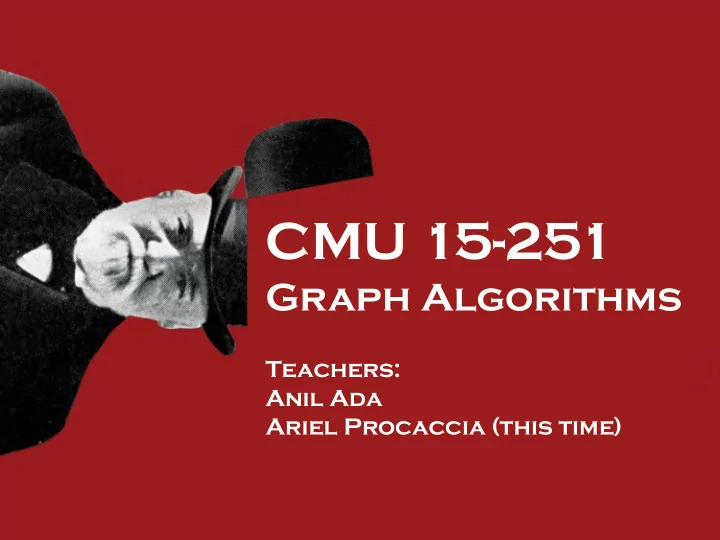

CMU 15-251 Graph Algorithms Teachers: Anil Ada Ariel Procaccia (this time)
Depth-First Search • For each 7 unexplored 𝑣 ∈ 𝑊 6 1 DFS( 𝐻 ,u) o DFS(graph 𝐻 , 𝑣 ∈ 𝐹 ) 3 • mark 𝑣 as explored 5 2 • for each {𝑣, 𝑤} ∈ 𝐹 4 if 𝑤 is o unexplored then DFS( 𝐻, v ) 𝑃(𝑛 + 𝑜) 2
Graph Search Problems 𝐻 • o 𝑡 𝑢 𝐻 o 𝐻 o • 3
Topological Sorting 𝐻 • 𝑔: 𝑊 → {1, … , 𝑜} 𝑣, 𝑤 ∈ 𝐹 𝑔 𝑣 < 𝑔(𝑤) 𝑏 𝑐 𝑑 𝑒 𝑓 𝑒 𝑏 𝑐 𝑑 𝑓 4
Topological Sorting 15 251 21 127 15 15 15 451 112 150 15 122 15 210 5
Topological Sorting • 𝑣, 𝑤 ∈ 𝑊 𝑣, 𝑤 ∈ 𝐹 • 6
Topological Sorting • • • • 7
Proof of Lemma • • 𝑜 ∎ 8
Naïve Algorithm • 𝑞 ← 𝑜 • while 𝑞 ≥ 1 3 If the graph doesn’t o have a sink then 4 5 2 return “not acyclic” else find a sink 𝑤 and o 1 remove it from 𝐻 𝑔 𝑤 ← 𝑞 o 𝑞 ← 𝑞 − 1 o 9
Better Algorithm Via DFS • 𝑞 ← 𝑜 • For each unexplored 𝑣 ∈ 𝑊 , DFS( 𝐻 ,u) 3 DFS(graph 𝐻 , 𝑣 ∈ 𝐹 ) • mark 𝑣 as explored 4 5 2 • for each {𝑣, 𝑤} ∈ 𝐹 , if 𝑤 is unexplored then DFS( 𝐻, v ) 1 • 𝑔 𝑣 ← 𝑞 • 𝑞 ← 𝑞 − 1 10
Correctness 𝐻 𝑣, 𝑤 ∈ 𝐹 • 𝑔 𝑣 < 𝑔(𝑤) • 𝑣 𝑤 o 𝑣, 𝑤 ∈ 𝐹 𝑤 (𝐻, 𝑣) 𝑤 𝑣 o 𝑣 (𝐻, 𝑤) (𝐻, 𝑣) (𝐻, 𝑤) ∎ 11
Weighted Graphs • 8 5 o 10 o 2 3 18 16 o 12 30 o 14 • 4 26 • 𝑑: 𝐹 → ℝ + 12
Minimum Spanning Tree 13
14
Minimum Spanning Tree • 𝐻 o 8 5 𝑑: 𝐹 → ℝ + 10 𝐹 ′ ⊆ 𝐹 o 2 3 𝑊, 𝐹 ′ 18 16 12 30 𝑓∈𝐹 ′ 𝑑 𝑓 14 4 26 • 42 15
16
Number of MSTs • • 𝑧 𝑦 𝑨 17
18
Prim’s Algorithm • 𝑊 ′ ← 𝑣 , 𝐹 ′ ← ∅ • While 𝑊 ′ ≠ 𝑊 8 5 5 o Let (𝑣, 𝑤) be a 10 minimum cost edge 2 2 3 3 18 16 16 such that 𝑣 ∈ 𝑊 ′ , 12 12 30 𝑤 ∉ 𝑊′ 14 o 𝐹 ′ ← 𝐹 ∪ 4 4 26 𝑣, 𝑤 o 𝑊 ′ ← 𝑊 ′ ∪ {𝑤} 19
20
Proof of Correctness 𝑈 • 0 ≤ 𝑙 ≤ 𝑜 𝑙 𝑈 • 𝑙 = 0) • • 𝑙 21
Proof of Correctness 𝑊 ′ • 𝑓 = {𝑏, 𝑐} • 𝑏 𝑓 • 𝑓 𝑑 𝑈 𝑓′ • 𝑈 a → 𝑐 𝑒 𝑐 𝑓 ′ = (𝑑, 𝑒) • 𝑊′ 22
Proof of Correctness 𝑈 ′ = 𝑈 ∪ 𝑓 ∖ {𝑓 ′ } • 𝑈 o 𝑜 − 1 o 𝑏 • 𝑈′ 𝑓 𝑑 𝑣 → 𝑑 → 𝑒 → 𝑤 𝑓′ 𝑓′ 𝑒 𝑐 𝑣 → 𝑑 → 𝑏 → 𝑐 → 𝑒 → 𝑤 𝑈 ∎ • 23
24
𝑊′ 25
The MST Cut Property 𝐻 • 𝑊 ′ ⊆ 𝑊 𝑓 𝑊′ 𝑊 ∖ 𝑊′ 𝑓 • • o o 26
Run-Time Race for MST • 𝑃 𝑛 2 • 𝑃(𝑛 log 𝑛) • • • 27
Run Time Race for MST 𝑃(𝑛 log 𝑛) → 𝑃(𝑛 log ∗ 𝑛) 28
Run Time Race for MST 𝑃(𝑛 log ∗ 𝑛) → 𝑃(𝑛 log(log ∗ 𝑛)) 29
Run Time Race for MST 𝑃(𝑛 log(log ∗ 𝑛)) → 𝑃(𝑛 ⋅ 𝛽 𝑛 ) 𝛽 ⋅ ? 30
Detour: 𝛽(⋅) • log ∗ 𝑛 = log 2 • log ∗∗ (𝑛) = log * 2 • log ∗∗∗ (𝑛) = log ** 2 • log ∗⋯∗ 𝑛 ≤ 2 • 𝛽 𝑛 = 31
Run Time Race for MST • • 32
Summary • o o o • o o o • o 33
Recommend
More recommend